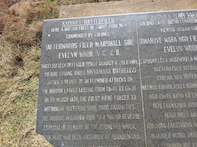Hlobane Mountain and Khambula
During the Anglo-Boer War, the town of Vryheid produced no less than five Boer generals. The region’s history of battle comes alive when you connect with a local guide. Hlobane and Kambula of the Anglo-Zulu War and Scheepers Nek, Lancaster Hill and Holkrans of the Anglo-Boer War are some nearby sites.

In 1879 Colonel Wood was ordered by Lord Chelmsford to engage the abaQulusi, an independent clan who had occupied Hlobane, a flat-topped, steep-sided mountain east of the Mfolozi River. Unbeknown to Wood, a 20 000-strong Zulu ‘impi’ had come to the aid of the smaller clan. The ensuing battle was an all-day affair, starting with the Zulu warriors taunting the British mounted unit into a spectacular running battle in the hilly terrain that favoured the Zulu foot soldiers.
You'll want a guide to get you round this site - they can arrange the permissions and access - so it's worth the trouble. With someone experienced you'll quickly be submerged in the events which led to the third Zulu victory of the Anglo-Zulu war (28 March 1879). Note that the top of Hlobane is notorious for hidden holes, sheer cliffs and sudden changes of weather, so go prepared.
On 29 March 1879, after the disaster on Hlobane Mountain, Wood retired with his survivors to Khambula, about 20km northwest of Vryheid (on the Paulpietersburg road). Fired up by their success the previous day, the strong Zulu force decided on an ill-conceived tactic, one that had seen the demise of so many armies before: a frontal attack on the prepared British forces.
At best it can be described as suicidal: from midday for four hours, successive waves of charging Zulu warriors were mowed down by the 'red squares' supported by light artillery and Gatling guns. As the Zulus retreated into the dusk, Wood let loose his cavalry to pick off stragglers. The Zulus suffered around 2 500 casualties; the British fewer than 30. This battle is generally considered the turning point of the Anglo-Zulu war.
Redoubt Hill
Redoubt Hill site is slightly off the beaten track. There is a marker post about 16 km north of Vryheid on the R33 which points toward the area, 5 km of dirt track takes you to the site of the British redoubt. Stand on the Redoubt Hill and imagine the British army fighting against overwhelming numbers on 29 March 1879.
The battle for which the Zulu army was not entirely prepared. Spurred on by its young bloods (and acting against King Cetshwayo's orders) they attacked in the usual 'horns of the bull' pattern. Unexpected boggy ground to the southwest delayed the left horn, allowing the British army first to deal exclusively with the right horn. After similarly wiping out the left horn, British cavalry turned the Zulu retreat into a rout.